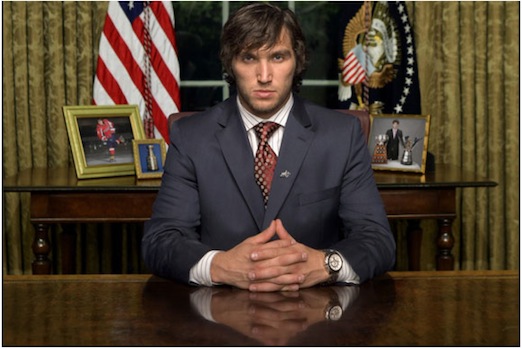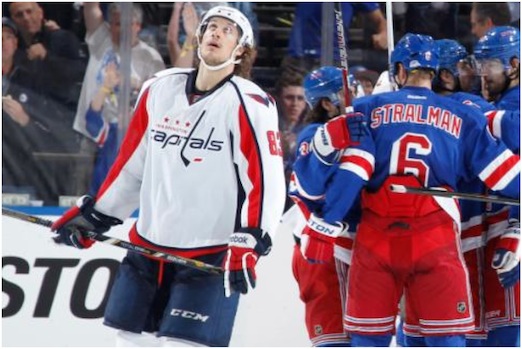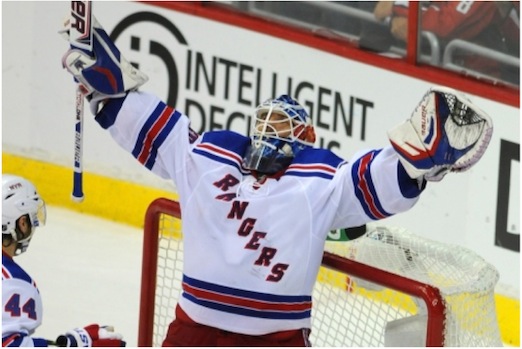Capitals Lose to Rangers, Ovechkin Loses his Mind
Last night the Capitals lost to the Rangers in dramatic Game 7 fashion. Well, the fact that it was a decisive Game 7 was dramatic, the game itself was far less so. Unlike the previous six games in the series, this one wasn’t even competitive.
Washington won Game 1 by two goals, but the next five games were decided by just one goal, two of which were in overtime. New York found the back of the net just one less time in one game than they had in the previous three games combined.
The Rangers finally found a way to score, repeatedly, and their superstar goalie Henrik Lundqvist was a brick wall in net—what else is new? The final score was 5-0, which is a certified blowout by hockey standards. It’s the kind of victory that’s nearly impossible to argue.
All the bad penalties and bad bounces in the world do not add up to a 5-0 loss in the NHL. That is unless you’re the Capitals paranoid superstar Alex Ovechkin, who called shenanigans on the entire affair after the game. Not just on Game 7 either—his accusations were far more widespread.
According to a post-game interview he gave in his native Russian language, Ovechkin first took issue with the referees. He asked rhetorically, one would imagine, “How can there be no penalties at all (on one team) during the playoffs?” Presumably referring to the Rangers.
Although since there were 21 penalties called on New York during the series, “no penalties” wasn’t entirely accurate. Yes, Washington was called for more penalties in the series, but there’s always the off chance that they actually committed more penalties.
Suppose that may just too easy an explanation though. Oh, and for the record, each team was called for two penalties in Game 7.
After pointing his finger at the officiating, Ovi shifted to a more broad strategy of blame. He proved his versatility as a two-way player by talking out of both sides of his mouth. If only he played defense so well on the ice, perhaps the Caps would’ve won.
Ovechkin essentially accused someone, not necessarily the NHL, but someone out there of being bound and determined for that series to go to a Game 7. He was relatively vague, but the gist of his accusation was that everyone is out to get the Capitals and that’s why they lost.
Cause they never lose in the playoffs. It’s science. (It’s not)
Makes you wonder if this mysterious boogeyman had his maniacal plan in place after Washington went up 2-0 in the series. Or when they had a chance to close it out in Game 6, but didn’t manage to score a single goal.
Is it the NHL’s fault that they can’t win in New York?
Is Madison Square Garden haunted by a Caps hating ghost?
Probably not.
Remember, the easiest explanation is usually the truth. The truth here is that the Capitals have a long and storied history of playoff failure.
Ovechkin is probably just sick and tired of carrying the weight of all those failures, which predate him by decades, and having to account for them at the end of each disappointing season.
The fact that he’s lashing out would be understandable if Ovi played and acted like he cared more about his job. When he turns it on, everyone knows he’s one of the greatest players in the game. Unfortunately, he has a history of phoning it in and completely checking out on occasion.
Ovechkin says what he wants and does what he wants, whenever he wants to do it.
When the NHL was still in talks earlier this year about whether or not to allow their players to participate in the 2014 Olympics in Sochi, Ovechkin was the only player in the league to publicly state that, regardless of the league’s decision, he would be participating in the games.
And despite chasing off two coaches in less than a season a year earlier, Ovi was again rewarded with the unending public support of Capitals owner Ted Leonis. Privately consenting to a request is fine. Publicly relenting to a demand is not.
In January 2012 Ovechkin was suspended three games for charging. It was a well deserved suspension, but he didn’t see it that way. So he pouted and punished the league by pulling out of the NHL All-Star game at the last minute.
Ovechkin said he didn’t “feel deserving to be there” because of the suspension, but then he launched into the same ‘woe is me’ routine he’s become famous for. He whined about the unjust suspension and the tragedy that his entire career would be tainted by it.
But back to the playoffs.
Ovechkin’s ridiculous comments aside, there are actually two more important issues being overlooked entirely. The first being that he isn’t the only person to cry conspiracy after a loss. Athletes in all sports do it. Coaches do it. Fans do it. And sometimes the media even does it.
It’s destructive, petty, and poor sportsmanship at its finest. Conspiracy theories are rarely proven because they’re often just fictional manifestations of irrational anger or epic frustration.
Maybe there was widespread collusion to bring down the Capitals and force a Game 7. Or maybe they just didn’t play well enough to win. Which sounds like the more likely scenario?
The second issue is that Alexander Ovechkin isn’t even the story today, at least he shouldn’t be the story today. He wasn’t the story through most of the series either.
New York’s goalie Henrik Lundqvist is the story. He kept his underdog Rangers in every game of that tight series, especially when the offense didn’t show up early on.
And with the pressure on in Game 7, playing on the road, Lundqvist blanked the Capitals in one of the biggest games of his career. He closed out the series with two consecutive shutouts, an absolutely phenomenal feat.
You’ll notice Ovechkin didn’t have anything to say about that in his post-game interview. Of course that would require recognizing someone else’s success, as well as his own team’s failure. Which means it was a notion that was never even on the table.
If it doesn’t involve placing blame, Ovi doesn’t want anything to do with it.
If it does involve placing blame on Ovi, generally I’ll want something to do with it. Praise me or hate me on Twitter, deep down I’ll still love you either way. **Follow me on Twitter: Follow @blamberr







